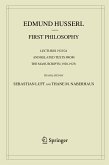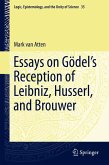This volume is roughly divided into two types of contributions: discussions of Heidegger's reception in the English-speaking world, and outstanding examples of English-language Heidegger scholarship. The first type includes both historiographical accounts of the encounters between Heidegger's thought and the Anglo-American world, as well as their philosophical expositions and critiques. The second group of chapters reveal the latest contemporary scholarship by contemporary Heideggerians writing in English. It is moreover the first volume to bring together thinkers from both genealogies of Anglo-American Heideggerianism appealing to students and researchers working in both of these camps.
Dieser Download kann aus rechtlichen Gründen nur mit Rechnungsadresse in A, B, BG, CY, CZ, D, DK, EW, E, FIN, F, GR, HR, H, IRL, I, LT, L, LR, M, NL, PL, P, R, S, SLO, SK ausgeliefert werden.









